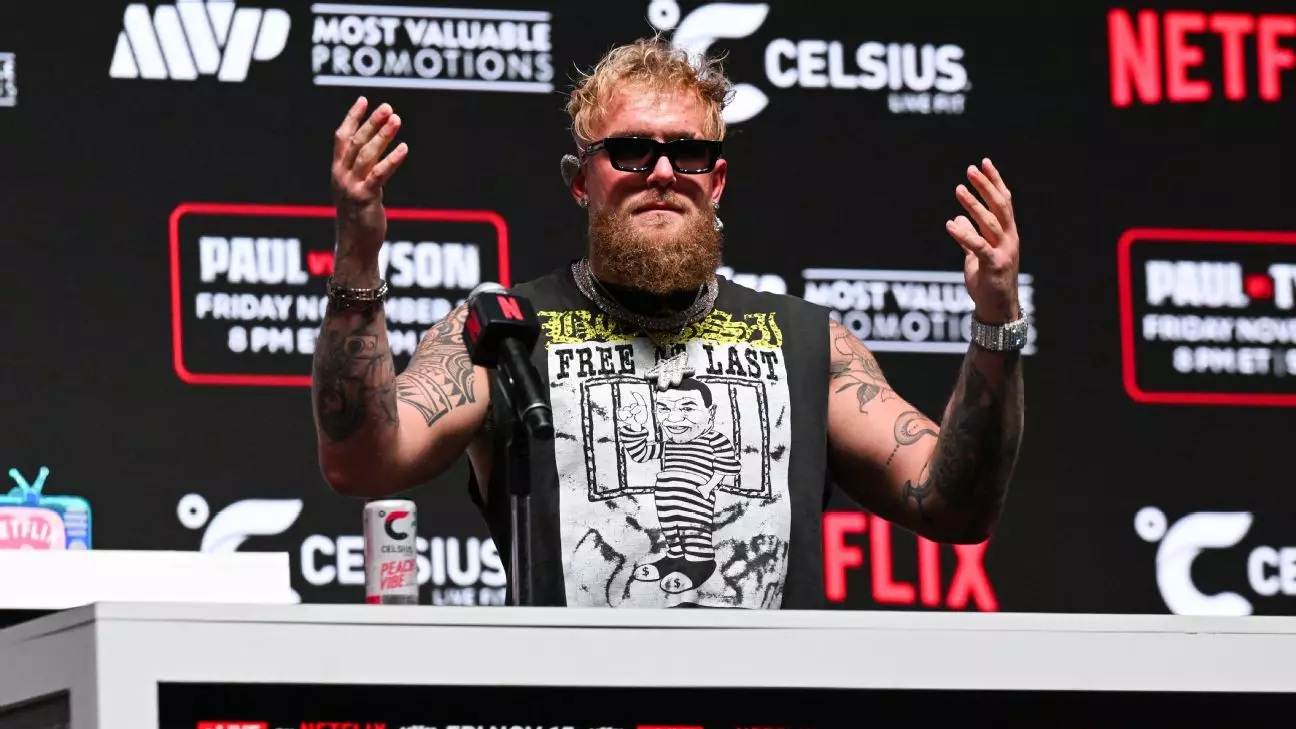In the modern era of boxing, few matchups generate as much buzz as the impending clash between Jake Paul and Mike Tyson. The fight, scheduled for this Friday, features two distinctly different personalities that epitomize the landscape of contemporary sports culture. Jake Paul, at just 27, has rapidly transitioned from being a controversial YouTube sensation to a recognized face in the boxing arena. In stark contrast stands Mike Tyson, a former heavyweight champion, revered not just for his prowess in the ring but also for his iconic status in the sporting world. Despite their age gap—Paul being nearly half Tyson’s age—each figure invokes markedly different reactions from fans and the media, setting the stage for an electrifying encounter.
Jake Paul thrives on the controversy that surrounds him. Since stepping into the boxing ring a little over four years ago, he has continuously drawn mixed reactions from fans and pundits alike. With a professional record of 10 wins, 1 loss, and 7 knockouts, Paul has undeniably found commercial success in the sport. However, his choice of opponents, often less-than-elite fighters from the realms of social media and mixed martial arts, has attracted skepticism regarding his legitimacy as a serious boxer. Even now, as he prepares to face the legendary Tyson—who has not fought competitively in two decades—Paul seems unfazed by the naysayers. He openly admits to leaning into the negativity, indicating that in the world of entertainment, all publicity is ultimately good publicity.
What makes the impending event more captivating is the undeniable dynamic at play: the young, brash contender versus the cherished veteran. During a recent press conference, Paul acknowledged his perceived villain status among fans. Yet, rather than recoiling from this image, he embraces it. “I can go heel and haven’t looked back since,” he candidly remarked. This perspective represents an intentional branding strategy in a sport that thrives on rivalries and narratives. Paul’s understanding of this marketing tactic is shrewd, as he positions himself as the antagonist in a larger story—one that ultimately elevates the stakes for the matchup.
He draws on the audience’s disdain to fuel interest in the event. His ability to convert detractors into viewers is a testament to his grasp of the larger entertainment picture. Paul even encouraged those who doubt him to wager against him, underscoring his willingness to engage with fans, regardless of their opinions.
Tyson, on the other hand, embodies the archetype of the “ultimate hero.” His storied past and transformative journey resonate with numerous fans who have followed his resurgences and struggles. The juxtaposition of Tyson’s glorious career and Paul’s controversial persona inevitably heightens intrigue. In a room filled largely with supporters cheering for Tyson during the press conference, Paul’s admission of this clear favoritism signifies a crucial understanding of the narrative he’s navigating. It’s a reminder that in sport—not just boxing—the capacity to evoke emotion is just as vital as winning.
Paul has promised fans an explosive bout, suggesting that neither fighter will be playing it safe. Claiming, “I fear no man,” he invites Tyson to draw upon his savage instincts, hoping to bring out the very essence of the fighter that once terrified opponents. This sets up dual expectations: fans want to see Tyson’s ferocity, while detractors are eager for Paul’s anticipated downfall.
As the fight draws nearer, the hype intensifies. The boxing world watches with bated breath, eager to witness a clash that not only pits generations against one another but also showcases diverging approaches to fame and competition. Jake Paul’s embrace of the villain role is not just strategic but also indicative of a newfound recognition—that sometimes, being the bad guy can elevate the stakes, turning a mere boxing match into an iconic cultural event. With the stage set, the narrative is as compelling as the bout itself, ensuring that regardless of the outcome, it’s an event that will be remembered in the annals of sporting folklore.



Leave a Reply